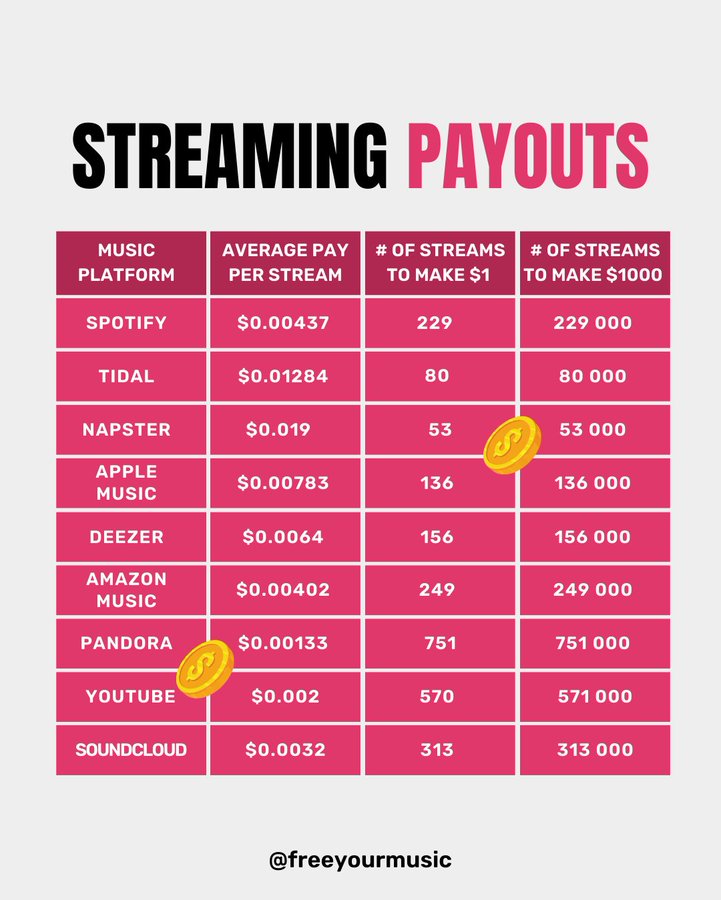So, we last examined Lucian’s statements around lower quality functional content and his accusations that black hat players are gaming the royalty system and that is one aspect of his letter to all Universal Music staffers we do agree needs to be stopped.
However, this article’s primary focus is on Lucian’s suggestion that we need to evolve the economic streaming music model. Let’s first examine what Mr. Grainge details in his letter to Universal Music staffers. “There is a growing disconnect between, on the one hand, the devotion to those artists whom fans value and seek to support and, on the other, the way subscription fees are paid by the platforms. Under the current model, the critical contributions of too many artists, as well as the engagement of too many fans, are undervalued”.
That is a very interesting paragraph for two very distinct reasons. Firstly, Grainge complains about a “disconnect” between the devotion of fans to artists and how streaming services pay artists via subscriptions for these fans’ devotion. Secondly, Lucian goes on to lament the current model as it undervalues both the value of artists and their fans. That we can agree on, however TMV disagrees on the solution. To adequately answer this question, it is critical to examine the current economics of the streaming music model.
Let’s look at the economics of the streaming business. First up, when it comes to Spotify Universal according to Music Buisness Worldwide Universal owned a total of 7% of Spotify shares. UMG was the only major label to hold onto its shareholding when Spotify floated in 2018, whereas Sony Music sold 50% of its 5.7% shareholding for $750 million. Via investment dilution UMG’s shareholding had fallen to a 3.37% shareholding in 2021. AT that point that shareholding was worth over $1.8 billion but within a year it fell to just over $511 million value.
An early January lawsuit by 90’s hiphop artist Black Sheep against UMG argues that Universal Music has not accounted for that Spotify equity ownership in its royalty payouts to artists within-its catalogue. UMG has publicly stated it will “share proceeds from its Spotify equity, should it ever sell it, with the artists on its roster“. A key question here is who will take responsibility for the dramatic fall in the value of its shareholding? Should UMG have been detailing the value of its holding and each respective artists share in royalty statements since its acquired its shareholding in Spotify?
So how does Universal music distribute its dividends across its catalogue of artists in both publishing and recorded music that it traded on to get the Spotify equity position in the first place? If it does not pass those earnings on (or its windfall in the case of it selling its shareholding), is it not just as bad as those black hat players gaming the royalty system? It would mean Universal Music is essentially stealing from its own catalogues of artists. A side question-here is how much did Sony artists receive when Sony Music sold 50% of its 5.7% Spotify shareholding for $750 million in 2018? How has Sony Music accounted for their equity ownership and sale in artists royalty statements/payouts if it did at all?
As far as an evolution of the streaming model, Spotify is a case in question, as detailed by Wayne Rosso’s article “UK Looking for labels & Streamers to Cough Up” outlines that Spotify cannot afford to run its streaming business as a loss leader like its competitors Amazon, Apple and Google can. If anything, the music business could learn that demanding a chunk of equity and large 3-year licensing advances that is a key reason Spotify pays less in actual per stream royalties than Amazon and Apple. We have provided a breakdown of what actual streaming services pay artist’s per stream and also how many streams it takes for a label to earn $1 for where the artists general receive 16% on average.

As this chart from free your music above details; whilst Spotify is not the worse payer in terms of a per stream rate it is also not the best. Ironically Napster, the service the music industry tried to kill is the service that pays the most per stream to labels and artists. It takes the least number of streams for a label to earn $1 and $1000 from music streams on Napster when compared to all music streaming services. Going further, YouTube music is one of the worst payers per stream (I will be pressing the unsubscribe button on my Youtube Music subscription and moving to try out Tidal and perhaps Napster). I will write a new story on my experience with using the two services that pay artists and labels the best by a large margin.
Food for thought is the fact that labels have pushed the majority of music streaming users too Spotify. Why? is it because of their current (and previous for some) conflict of interest via ownership of shares in Spotify? Because, if so they have really screwed their own artists whilst profiting from screwing over their own artists. It is TMVs view that it should be legislated and in every artist contract that if a record label owns shares in a music streaming service it should dividends received form such owner ship or the proceeds of sale in shares of such services should be distributed to artists.
Whilst the majority of major labels make bold statements that they pay through such gains to artists. TMV are yet to have been shown any definitive evidence that this is the case. We would welcome it if any label was willing to show us how they break down and distribute such income to artists…but we will not hold our breath!
The high cost of working with record labels is also no doubt the reason Spotify made the move into pushing podcasts. Despite paying large upfront fees these podcasts have generated big advertising and subscriber revenues for Spotify and are perhaps a lot more profitable than the largest music artists on its platform. It could be argued that because of these high costs associated with working with the music business Spotify has nowhere to find extra payments to labels as music streaming is its core business.
The irony of all this is the fact that Apple music pay high royalties per stream to labels and therefore artists because it is run as a loss leader and is not their core business. The problem though is because labels owned equity in Spotify, they pushed most music fans away from Apple to sign up to Spotify. In the process they have shot themselves and their catalogue of artists in the foot in terms of royalty returns.
What does this signify in respect of an evolution of the music streaming business model? Perhaps it means the labels need to look internally to themselves to help evolve the business model. Yes, I mean perhaps they need to start thinking about paying artists more from their own cut they receive from the streaming services. As the recent article from Music Ally details that there were 3.4 trillion on demand audio streams worldwide in 2022. Of these 1-3% are fake streams totally between $169m and $507, which sounds like a lot.
However, if we compare those black hat royalty stealing figures to the IFPI figures of $16.9bn of trade revenues being earned by labels in 2021, it paints a picture that the labels still have plenty of room to pay artists more from their streaming income. Let me be very clear TMV does not in any way condone or support these black hat players and their dodgy business model. Yet, we do believe it has a very small impact on the labels ability to pay artist more from what is paid to them by streaming services.
The problem labels face is that Amazon, Google and Apple are so big and music streaming is such a small slice of their overall revenues they regularly tell the labels to piss off when asked for more. These gorillas of technology have the clout to not worry, as they know timid labels will just go and bully Spotify and other independent streaming services for higher payouts until they go bankrupt.
When this occurs these same labels will be in an even weaker position, with these 64-ton technology gorillas who will continue to ride roughshod over them. An alternative in TMV’s view is the labels should be leveraging the fact Google, Amazon, and Apple need music to leverage the service and devices their core businesses are based on. To answer Sir Lucian Grainge’s question relating to the need for ‘an innovative artist-centric’ model’, TMV say you already have it in your own back pocket.
Start properly valuing your own artists and pay them more from what you receive from streaming services, as detailed in our story titled Crowdsourcing Artist Development, Labels are not investing in A&R in the way they did prior to these streaming services and as such have less costs and more revenue that they can access and offer to artists in way of higher streaming royalties.
On a final note, labels and publishers need to grow some cajones, negotiate hard and threaten removal of their tracks from Amazon, Google and Apple services, instead of bullying Spotify and other independent streaming services. You have the leverage, their services and /or devices lose considerable value without music, and they can easily afford to pay more to ensure their uses have access to music which gives their products value. To do this would reverse the stupidly of the previous era of CEO’s of global music businesses in the early 2000’s who essentially sold their souls to Apple for peanuts. Sadly, labels and artists have been screwed ever since.



